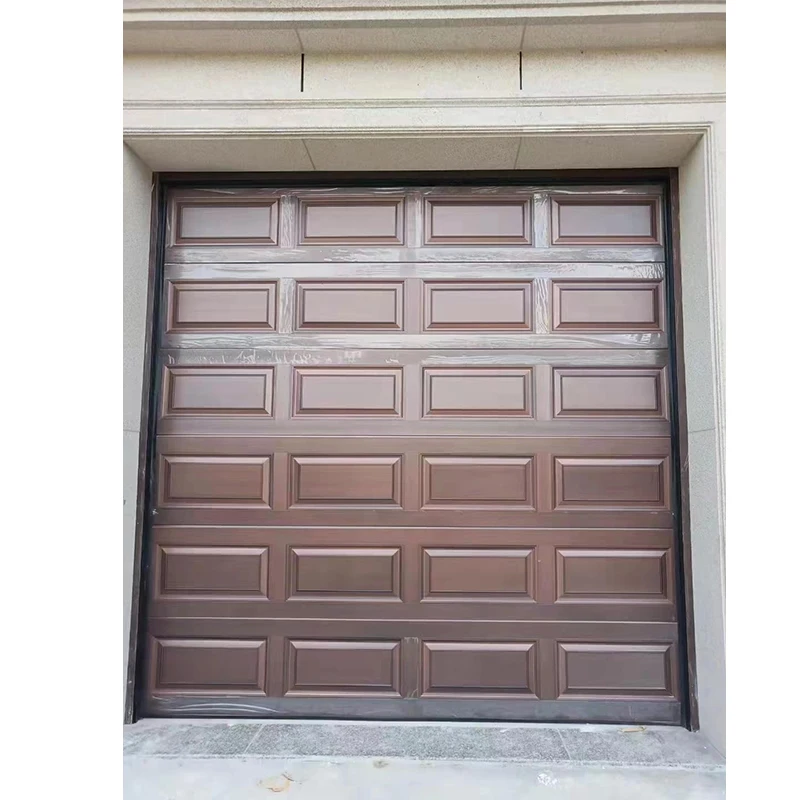Selecting the right garage door for your home represents one of the most important decisions homeowners face when upgrading their property. A well-chosen garage door enhances curb appeal, improves security, and can significantly increase your home's value while providing years of reliable service. With numerous materials, styles, and features available in today's market, understanding the key factors that distinguish quality options becomes essential for making an informed purchase decision.

Modern garage doors serve multiple functions beyond simply providing access to your garage space. They act as a barrier against weather elements, contribute to your home's insulation efficiency, and serve as a prominent architectural feature that visitors notice immediately. Understanding these various roles helps homeowners prioritize features that matter most for their specific situation and climate conditions.
Essential Materials and Construction Quality
Steel Construction Advantages
Steel remains the most popular material choice for residential garage doors due to its exceptional durability and versatility. High-quality steel doors feature multiple layers of galvanized steel with protective coatings that resist rust, dents, and weather damage. The gauge thickness of steel directly impacts strength and longevity, with heavier gauge numbers indicating thinner material and lighter gauge numbers representing thicker, more robust construction.
Premium steel doors often incorporate insulation layers between steel panels, creating superior thermal efficiency compared to single-layer alternatives. This insulation helps maintain consistent temperatures within attached garages and reduces energy costs for homes with living spaces above or adjacent to the garage area. Additionally, steel construction allows for diverse design options, from traditional raised panels to contemporary smooth finishes that complement various architectural styles.
Alternative Material Considerations
While steel dominates the market, alternative materials offer unique benefits for specific applications. Aluminum doors provide lightweight construction with excellent corrosion resistance, making them ideal for coastal environments where salt air poses challenges for other materials. Wood doors deliver unmatched natural beauty and customization options but require regular maintenance to preserve their appearance and structural integrity.
Composite materials blend various elements to create doors that mimic wood's appearance while offering improved durability and lower maintenance requirements. These hybrid options appeal to homeowners seeking aesthetic appeal without the ongoing care demands associated with natural wood products.
Security Features and Access Control
Locking Mechanisms and Hardware
Modern garage door security extends far beyond basic manual locks, incorporating sophisticated mechanisms that protect against unauthorized access attempts. Multi-point locking systems engage at several locations along the door's perimeter, distributing force more effectively than single-point alternatives and creating superior resistance against forced entry attempts.
Heavy-duty hinges, reinforced brackets, and tamper-resistant hardware contribute significantly to overall security performance. Quality manufacturers design these components to withstand both everyday use and potential security threats, using materials and finishes that maintain functionality despite exposure to temperature fluctuations and moisture.
Electronic Access and Automation
Contemporary garage door systems integrate advanced electronic controls that enhance both convenience and security. Rolling code technology prevents unauthorized duplication of remote control signals, while smartphone connectivity allows homeowners to monitor and control access from anywhere with internet connectivity.
Battery backup systems ensure continued operation during power outages, preventing homeowners from becoming locked out of their garages during emergencies. Smart integration capabilities allow garage doors to connect with broader home automation systems, enabling coordinated responses to security events or scheduled routines.
Insulation and Weather Resistance
Thermal Performance Standards
Proper insulation transforms a garage door from a simple barrier into an energy-efficient component of your home's thermal envelope. R-value measurements indicate insulation effectiveness, with higher numbers representing superior thermal resistance. Climate considerations play a crucial role in determining appropriate insulation levels, as extreme temperatures demand more robust thermal protection.
Polyurethane foam insulation provides superior performance compared to polystyrene alternatives, filling cavity spaces completely and adhering to door panels for enhanced structural strength. This injection-molded approach eliminates thermal bridging that occurs with board-style insulation, creating more consistent temperature control throughout the door surface.
Weatherproofing and Sealing
Effective weather sealing prevents water infiltration, reduces air leakage, and blocks debris from entering garage spaces. Quality weatherstripping along door perimeters uses durable materials that maintain flexibility across temperature ranges while providing reliable sealing performance year after year.
Bottom seals require special attention as they experience the most wear from contact with garage floors and exposure to moisture. Replaceable bottom seals allow homeowners to maintain optimal sealing performance without replacing entire door systems when wear occurs.
Installation and Professional Considerations
Professional Installation Benefits
Professional installation ensures proper garage door function, safety, and warranty compliance while protecting homeowners from potential injury risks associated with high-tension springs and heavy door panels. Experienced installers possess specialized tools and knowledge required for precise adjustments that optimize door balance, operation smoothness, and component longevity.
Proper installation includes careful attention to track alignment, spring tension calibration, and safety feature testing that prevents accidents and premature component failure. Professional installers also verify compliance with local building codes and manufacturer specifications that may affect warranty coverage.
Maintenance and Service Requirements
Regular maintenance preserves garage door performance and extends service life significantly beyond neglected systems. Lubrication schedules, hardware inspections, and safety feature testing should occur according to manufacturer recommendations to prevent unexpected failures and maintain optimal operation.
Understanding basic maintenance requirements helps homeowners budget for ongoing costs and recognize when professional service becomes necessary. Simple tasks like visual inspections and basic cleaning can be performed by homeowners, while spring adjustments and electrical repairs require professional expertise for safety reasons.
Design Integration and Aesthetic Appeal
Architectural Compatibility
Garage door selection should complement existing home architecture while considering future renovation plans that might affect overall design harmony. Traditional raised panel designs suit colonial and craftsman style homes, while contemporary smooth surfaces complement modern architectural elements and clean lines.
Window placement and hardware styles provide opportunities for customization that enhances visual appeal without compromising functionality. Decorative hardware can transform basic doors into focal points that contribute positively to curb appeal and property values.
Color and Finish Options
Color selection impacts both aesthetic appeal and long-term maintenance requirements, as darker colors may show wear differently than lighter alternatives while affecting thermal performance in sunny climates. Factory-applied finishes typically provide superior durability compared to field-applied alternatives, resisting fading and weathering more effectively.
Textured finishes can mask minor imperfections and provide visual interest while requiring less frequent cleaning than smooth surfaces. Understanding how different finishes perform in specific climate conditions helps homeowners make informed decisions that balance appearance with practical considerations.
Cost Factors and Value Analysis
Initial Investment Considerations
Garage door costs vary significantly based on materials, features, and installation complexity, making budget planning essential for achieving desired results without overspending. Premium features like enhanced insulation, advanced security systems, and decorative elements add value but require careful evaluation against actual usage needs and local climate demands.
Comparing total installed costs rather than material prices alone provides more accurate budget estimates and prevents unexpected expenses during installation. Quality differences between manufacturers can justify price variations, making feature-by-feature comparison essential for identifying best value options.
Long-term Value and Return on Investment
Energy savings from properly insulated garage doors can offset higher initial costs over time, particularly in regions with extreme temperature variations. Improved security features may qualify for insurance discounts while enhanced curb appeal contributes to property values that benefit homeowners during resale.
Durability differences between quality levels affect replacement timing and lifetime costs significantly. Investing in higher-grade materials and construction often proves more economical than frequent replacements of budget alternatives that fail prematurely under normal use conditions.
FAQ
How long do quality garage doors typically last
Well-maintained garage doors constructed from quality materials typically provide 15 to 30 years of reliable service, depending on usage frequency, climate conditions, and maintenance consistency. Steel doors generally offer longer service life than wood alternatives, while proper installation and regular maintenance significantly extend operational life regardless of material choice.
What factors determine appropriate insulation levels
Climate conditions, attached living spaces, and energy cost considerations determine optimal insulation requirements for garage doors. Homes in regions with extreme temperatures benefit from higher R-value insulation, while attached garages beneath living areas require enhanced thermal protection to maintain comfort and reduce energy consumption.
Are smart garage door features worth the additional cost
Smart features provide convenience and security benefits that many homeowners find valuable, particularly for busy families or frequent travelers. Remote monitoring capabilities, automatic closing schedules, and integration with home security systems justify additional costs for users who prioritize connectivity and automated control options.
How important is professional installation versus DIY approaches
Professional installation ensures safety, warranty compliance, and optimal performance while protecting homeowners from injury risks associated with high-tension springs and heavy door components. The complexity of modern garage door systems, including electronic controls and safety features, typically exceeds DIY capabilities and requires specialized knowledge for proper function.

